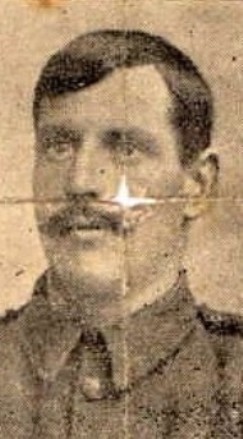
Information provided by Roger and Helen Raisbeck.
Percy Charles Perry was born on 22 June 1886 to George and Selina Perry in Dorset, England. In 1902, at the age of 16, he joined the 5th Battalion of the Coldstream Guards at Yeovil (probably transferring to London before 1905). In 1905 he transferred to the army reserve (and enlisted again in 1914 service number 18562, Coldstream Guards). He fought at the Battle of Mons which was the first major action of the British Expeditionary Force (BEF) in the First World War. He was wounded in action and hospitalised. He sent a photograph postcard home to his wife, Lucy, simply saying “I am first on your left [in the picture], going alright, PP”. Unfortunately he was unable to return to action and was discharged on 7 October 1915.
He qualified for the 1914 Star (also known as the Mons Star) on 13 August 1914 as well as being awarded the British War medal and the Victory medal.
Percy had 5 brothers, 4 of which joined the navy. One of his younger brothers, Ernest Sydney Perry, was lost in the Battle of Coronel off the coast of Chile on board HMS Monmouth on 1 November 1914. A newspaper cutting calling the Perrys a “Family of Patriots”, shows Percy in the centre flanked on either side by his brothers. Percy returned to civilian life back in England after his discharge in 1915 and encouraged his daughter Edna May Perry to knit socks for soldiers as part of the war effort.
Percy died in March 1944 at the age of 57 in his home county of Dorset.


Explore more memories from the ribbon
-
Regimental Chapel, St Mary’s Church
In 1930 St Mary’s Parish Church offered the Lady Chapel as a memorial chapel for the Green Howards. This gift recognised that for over a century St Mary’s had been the garrison church for the regiment. The church already held the Green Howard’s Book of Remembrance for those who had been killed in the First World War, the regiment’s old Colours (Regimental flags) and many individual memorials. Fundraising began in 1931 but the economic depression made for a very challenging campaign. In August £386 had been raised but in September the regimental magazine noted, ‘Subscriptions to the Chapel fund have been most disappointing. In view of the present depressing state of the country this is not altogether surprising, but the Committee most earnestly appeal to all Green Howards to do their utmost to assist in completing the Chapel as a tribute to those whose memory it will perpetuate.’ The cry for assistance was heard and by the end of 1931 a date of Sunday, March 13th 1932 had been set for the dedication of the Chapel. The dedication service was led by the Bishop of Ripon. In his sermon he praised the Green Howards for providing a, ‘special place of prayer. It was a reminder that the war has a spiritual and Godward side, and taught them, among other things, the hopelessness of materialism as a way of life.’ As well as housing the Book of Remembrance the chapel also includes a number of items given in memory of soldiers…
-
4/7766 Private Thomas Holmes
Mary Burn visited the Green Howards Museum to tell us about her father’s cousin, Thomas Holmes. Prior to the outbreak of the First World War, Thomas Holmes worked for Mr Gaffanney, a coal dealer in Leeds. As a reservist, he was called up on the outbreak of War to the 9th Battalion, the West Yorkshire Regiment while his brother served with the 1st Scots Guards. At only 19 years of age, Private Holmes was sent to Gallipoli. One of the thousands to die at Suvla Bay, he was killed on 29th October 1915 and is buried at Hill 10 cemetery along with 548 other casualties.
-
Thomas Tidyman
Information submitted by Lynne Pengelly. Thomas William Tidyman known as Bill (although this may have only been after he moved to Bradford) Born 1st November 1896 in Norton, Stockton on Tees the 2nd child, eldest son of John and Mary Tidyman The 1911 census shows him living and working on a farm in Agglethorpe (possibly Brecongill) with his parents and 6 siblings, his older sister is listed as a diarymaid. He enlisted on 24th May 1918 at the age of 23 into the 9th battalion of the Yorkshire Regiment and was wounded by a gunshot in his right forearm sometime in September 1918, he was transferred to the Bangour War hospital in Edinburgh and was discharged on 19th June 1919. Carl at the Green Howard’s museum was able to tell me that my grandad had been a marksman when he saw the badge on his uniform and also explained about the silver war badge given to injured men to wear after they had been discharged as unfit for further war service. After the war he returned to the farm his father died in 1920 and his mother died in 1927, at sometime he met my grandma who was visiting some friends who had relocated to Coverdale and they were married in Bradford on 7th December 1929. He was a tenant farmer at Harrop Edge Farm in Allerton Bradford until 1942 and then the family moved to Allerton village and he had a milk round. He worked for the War Ag…
